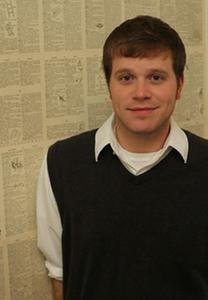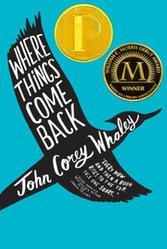 John Corey Whaley, who goes by "Corey," won the 2012 Michael J. Printz Award and the William C. Morris Award for his first book, Where Things Come Back (Atheneum), which was also named a "5 Under 35" Fiction Selection for 2011 by the National Book Foundation. Whaley grew up in Louisiana, lived for a time in Dallas, Tex., and now resides in Los Angeles. Here he discusses his path to the publication of Noggin (Atheneum/S&S) and how he made the incredible premise seem plausible: 16-year-old Travis Coates, whose body is riddled with cancer, agrees to be cryogenically frozen, and "comes to" five years later with his healthy head affixed to someone else's healthy body.
John Corey Whaley, who goes by "Corey," won the 2012 Michael J. Printz Award and the William C. Morris Award for his first book, Where Things Come Back (Atheneum), which was also named a "5 Under 35" Fiction Selection for 2011 by the National Book Foundation. Whaley grew up in Louisiana, lived for a time in Dallas, Tex., and now resides in Los Angeles. Here he discusses his path to the publication of Noggin (Atheneum/S&S) and how he made the incredible premise seem plausible: 16-year-old Travis Coates, whose body is riddled with cancer, agrees to be cryogenically frozen, and "comes to" five years later with his healthy head affixed to someone else's healthy body.
Where did the idea come from, for a transplantation of a full cranial structure onto a donor body?
I thought about why I liked Kurt Vonnegut. What is it about him that I'm able to connect with so much? He's able to take absurd ideas and scenarios, and you can be laughing hysterically on one page, and he'll bring you to tears on the next. Could I take something absurd and ground it in some sort of emotional reality? What about a literal out-of-body experience? That's where it came from.
What was it about the five-year time lapse that was key?
The original lapse was going to be 10 years. Last year was my 10-year high school reunion. I didn't want to go. I thought, "These people won't have changed that much, but just enough to not be the people I knew 10 years ago." I kind of wanted to keep some of them the way I remembered them.
When I decided to do five years, it was first of all supposed to be funny. Travis was expecting to come back 100 years in the future or expecting to never wake up. With the five-year thing, I was able to have him experience a world that was not different, but just one little tiny step ahead of him. That was the most realistic way I could re-create the way people feel their friends and family are growing up a little faster than they are. A lot of life is people moving faster than we are, and us moving faster than others. Being 16, and being only 16, and not being able to not be 16 in the context of this story is what I wanted to explore; you're right there at the cusp of waiting to see what will happen to everyone.
Cate and Travis were inseparable before he was frozen. In the intervening years, Cate decides to move on, but Travis is still in love with her.
The more I got into the story, I didn't want to go the cliché route of Cate having a bad boyfriend; that would take away from Cate's character. She judges people quite well. Even if not for her own good, she's unable to let Travis go. Everyone says Turner [her fiancé] is a really nice guy. That makes Travis even angrier. Turner is Travis--five years older.
Even while the situation with Cate is rife with problems, Travis and Kyle find a way to work things out.
Whereas Cate was able to move on, Kyle was not able to connect with anyone the way he connects to Travis. Kyle didn't have a great time of it when Travis left; he reverted to being secretive. Travis is taking his nap and waking up, but Kyle had to go to bed every night for five years, wondering if he'd ever have someone like Travis that he could be honest with.
I struggled with the fact that Cate and Kyle don't go to Travis immediately [when he comes back]. Kyle was so afraid that if he saw Travis and lost him again, that he'd never be able to recover. He couldn't risk it.
The friendship between Travis and Hatton, and its beginnings, are so terrific. How did Hatton come to you?
I had a lot of fun writing him. I'll be accused of making the best friend the most likable character. It's too fun not to. I think it makes my job a little easier. When I have someone very different from the narrator, he's able to show the flaws. In our lives, there are usually one or two people trying to relieve us of whatever our hardships are. That's what Hatton and Kyle do.
Travis helps Kyle be honest with himself, and then Kyle is able to return the favor when Travis comes back.
It goes back to the thing of Kyle still having trouble liking himself because of his struggle with identity. When Travis died, Kyle didn't get to do these things [that he and Travis and Hatton do together]--because of his secret and because Travis died. Kyle is getting a second chance, too.
What inspired the idea of Travis having someone like himself, a compatriot to talk to, in Lawrence Ramsey?
I thought, "How do I write a book about a situation that's never happened before? How do I know what Travis is going to feel like?" There's no research to do on someone coming back from the dead. I had to put that mindset into Travis's head. The most horrible thing is that you'd be experiencing something no one else had ever experienced. With an adult coming back, he'd [get to] be in the car commercials to benefit his family. Lawrence Ramsey is hassled by the media. I wanted to show that in opposition to Travis, who's still protected, by his parents and the school. In a subtle way, to show that even if Travis feels out of control, he's still in a safe situation.
Lawrence says, "How do I live up to this? How can I be the man that this woman waited for for five years?" Everything he'll do will be a little less than what they thought they were waiting for. It's in juxtaposition to Travis. If Cate had waited, would they still be the same? Would she still be able to love Travis the same way? Would Cate-and-Travis still exist if she'd been a miserable, sad person putting her life on hold? Which would you rather?
 In both Where Things Come Back and Noggin, you play with the idea of second chances. What draws you to this theme?
In both Where Things Come Back and Noggin, you play with the idea of second chances. What draws you to this theme?
I'm the second-chance guy. Someone tweeted the other day, "I think it's really great that the title for Where Things Come Back could also be the title of Noggin." In my third book, I think it also applies. It's a fascination of mine. With WTCB, I knew they'd all have second chances.
With Noggin it was fueled more by the Vonnegut-esque idea: Can you ground an absurd story in realism and emotion and have a reader connect with something that's impossible? I think it stems from growing up in a really small town, and you see a lot of people who never went the extra step to do what they wanted to do or to live the life they constantly think they should be living. That affected me when I was younger--a dread of aging, that I'd go right back to that place. Not that it's a horrible place, but it's not a place I wanted to be.
Noggin could be me processing the huge change of life I had going from a teacher to an author. The book thing was what I always wanted to do. That was me waking up from a frozen nap, if you will. --Jennifer M. Brown

